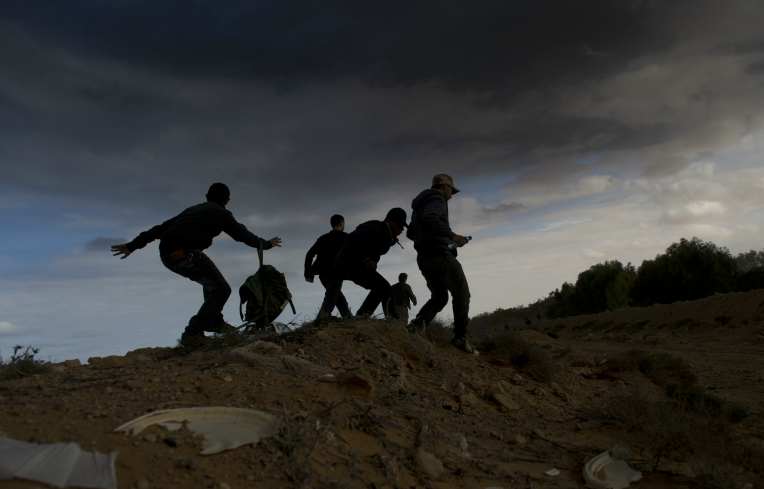In Retreat
By March 14, the rebels had been pushed back some 160 miles from their furthest advance toward Tripoli. Ras Lanuf and Brega were back in Qaddafi’s hands; Addario had seen both fall. She and Hicks were holed up in the town of Ajdabiya, along with the rest of the pack of photographers, and there was fighting on the west gate. If Ajdabiya fell, Qaddafi’s troops would move on to Benghazi.

Rebels fleeing from security forces
Photo by Lynsey Addario
The violence was escalating. By mid-month, rumors began to spread that Qaddafi was promoting rape as a weapon of war; in Ajdabiya, there were intimations of sexual violence near the west gate, and doctors had found Viagra and condoms in the pockets of dead Qaddafi soldiers brought to the hospital morgue—evidence, they told the news network Al Jazeera, of a campaign to commit mass rapes to punish the town and intimidate the opposition. [33] Journalists in eastern Libya were also coming under attack. On March 8, CPJ raised a public alarm after a grenade was thrown into the lobby of the Ouzo Hotel in Benghazi, where a large number of foreign journalists had been staying. [31] The same day, three BBC journalists and their driver were arrested by Qaddafi soldiers at a checkpoint outside Zawiyeh. Detained for 21 hours, they were hooded, handcuffed, beaten, accused of illegal reporting and espionage, and subjected to mock executions. [32]
To Addario, the situation seemed increasingly surreal. She knew that she had some strong pictures from her time in Libya, but she worried that a lot of the others were “mediocre.” In an email to CNN correspondent Ivan Watson on March 14, Addario summed up the situation: “qaddafi’s forces heading back east, and the rebels are surrendering along the way… so exhausted. this story has been one of the most dangerous i have ever covered. getting bombed from the air and by land, with no cover, and no flack and helmet.” [34] Maybe it was time to go.
Premonition . On the morning of March 15, Addario had what she calls a “horrible premonition,” a strong sense that she would be taken by Qaddafi troops. “I have days when I’m scared and there’s no reason, it’s my intuition or instinct,” she says.
And sometimes I have days when I’m fearless, you know? And the only thing I’ve done over the last 11 years of covering combat is to listen to my instinct and my intuition. That’s the only thing I can do.
Addario worried that Qaddafi troops, already on the western gate, would flank north and south, encircling the town. Hicks disagreed, recalling that in both Ras Lanuf and Brega, the army had advanced straight ahead, taking the towns only after several days of attack from the west. [35] Addario usually deferred to Hicks’s greater military experience, but this time she remained uneasy.
In a conversation the night before, she had told the Times foreign photo editor she was pulling back to Benghazi; from there she would make her way home. She gave her husband the same news that morning. Addario knew it could be risky to decide to leave but then stay on. “When you’ve already mentally checked out, it’s very dangerous to be in a war zone,” she says. “You have to be fully present because things are happening all around you and you have to make decisions every single second, because every second something is changing.” She just had to get through the day.
A bomb had exploded earlier on the west side of town. Addario and Hicks went to the hospital, looking for casualties. At noon, they were joined by two New York Times colleagues; the group wanted to head to the western gate to cover the fighting. The other correspondents were Beirut bureau chief Anthony Shadid, and Stephen Farrell, a reporter, videographer, and recenteditor of the paper’s At War blog who had been kidnapped twice in Afghanistan.
[31] “CPJ Condemns Attacks on Press in Libya, Yemen, and Egypt,” Committee to Protect Journalists, March 9, 2011. See: http://www.cpj.org/2011/03/cpj-condemns-attacks-on-press-in-libya-yemen-and-e.php
[32] Feras Killani, Chris Cobb-Smith, and Goktay Koraltan, “BBC’s Team’s Libya Ordeal in Their Own Words,” BBC Mobile, March 9, 2011. See: http://www.bbc.co.uk/news/world-africa-12695138
[3] Michel Martin, host, Al Jazeera reporter Sue Turton, “Reports Emerging of Rapes by Libyan Soldiers,” NPR News, Tell Me More, March 31, 2011. See: http://www.npr.org/templates/story/story.php?storyId=135011836
[34] CNN Wire Staff,“4 New York Times Journalists Reported Missing in Libya,” March 17, 2011. See: http://edition.cnn.com/2011/WORLD/africa/03/16/libya.missing.journalists/?hpt=T2 ; Boston Boomer, “Four NYT Journalists Missing in Libya,” Sky Dancing Blog, March 16, 2011. See: http://skydancingblog.com/tag/lynsey-addario/
[35] Anthony Shadid, Stephen Farrell, Tyler Hicks, and Lynsey Addario,“4 Times Journalists Held Captive in Libya Faced Days of Brutality,” New York Times, March 23, 2011. See: http://www.nytimes.com/2011/03/23/world/africa/23times.html?_r=1